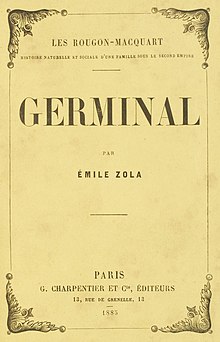 First edition, 1885 | |
| Author | Émile Zola |
|---|---|
| Translator | Havelock Ellis (1894), Peter Collier (1993), Roger Pearson (2004) |
| Language | French |
| Series | Les Rougon-Macquart |
| Genre | Novel |
| Publisher | G. Charpentier |
Publication date | 1885 |
| Publication place | France |
Published in English | 1894 |
| Media type | Print (hardback and paperback) |
| Pages | 592 (paperback) |
| 843.8 | |
| Preceded by | La Bête humaine |
| Followed by | Nana |
Germinal is the thirteenth novel in Émile Zola's twenty-volume series Les Rougon-Macquart. Often considered Zola's masterpiece and one of the most significant novels in the French tradition, the novel – an uncompromisingly harsh and realistic story of a coalminers' strike in northern France in the 1860s – has been published and translated in over one hundred countries. It has also inspired five film adaptations and two television productions.
Germinal was written between April 1884 and January 1885. It was first serialized between November 1884 and February 1885 in the periodical Gil Blas, then in March 1885 published as a book.
The title (pronounced [ʒɛʁminal]) refers to the name of a month of the French Republican Calendar, a spring month. Germen is a Latin word which means "seed"; the novel describes the hope for a better future that seeds amongst the miners. As the final lines of the novel read:
Des hommes poussaient, une armée noire, vengeresse, qui germait lentement dans les sillons, grandissant pour les récoltes du siècle futur, et dont la germination allait faire bientôt éclater la terre.
Men were springing forth, a black avenging army, germinating slowly in the furrows, growing towards the harvests of the next century, and their germination would soon overturn the earth.— 1885 translation[1]
- ^ "7-6, Germinal, Emile Zola, 1885". Retrieved 5 March 2023 – via www.ibiblio.org.